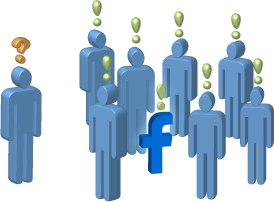 Social media companies often counter the criticism that their platforms are being used to spread hate speech by showing how they also provide a platform for counter-speech. Thus, by providing a space for all kinds of voices, ideas and opinions, they allow a dialogue to flourish.
Social media companies often counter the criticism that their platforms are being used to spread hate speech by showing how they also provide a platform for counter-speech. Thus, by providing a space for all kinds of voices, ideas and opinions, they allow a dialogue to flourish.
Unfortunately, a new study by led by Michela Del Vicario of Italy’s Laboratory of Computational Social Science, proves what we have always intuitively guessed. That instead of a promoting a dialogue, social media companies are only building echo-chambers, where people seek out confirmation for their biases, ignore contrary information, and thus land-up with more extreme biases then when they began with.
The research set out to find out whether when people are online, do they encounter opposing views, or do they create the virtual equivalent of gated communities? The research tracked all posts made on Facebook from 69 webpages (spreading conspiracy theories, science news and deliberate and malicious misinformation) over a five-year period in order to do that.
The outcome, as Del Vicaro discussed in the Australian Financial Review, suggests that “users mostly tend to select and share content according to a specific narrative and to ignore the rest”. On Facebook, the result is the formation of a lot of “homogeneous, polarised clusters”. Within those clusters, new information moves quickly among friends (often in just a few hours). The consequence is the “proliferation of biased narratives fomented by unsubstantiated rumours, mistrust, and paranoia”.
The academics believe that social media companies need to play a more active role in helping people check the trustworthiness of the information they view.
OHPI thinks they need to do more than that. They need to play a more active role in managing the content on their platforms, stop the spread of hateful and misleading information, and take people’s reports of the same more seriously.
Help us share this work:
Your support via our Facebook page can also help in our work to combat all forms of online hate. To receive a monthly e-mail summary of our work you can also join our mailing list.
